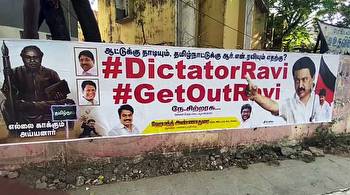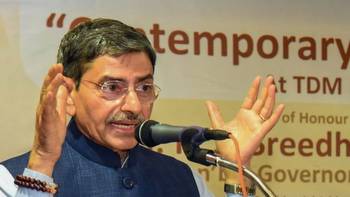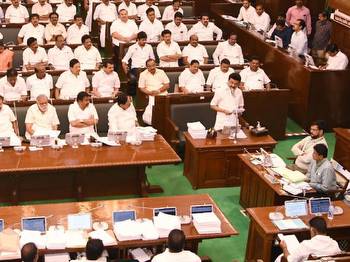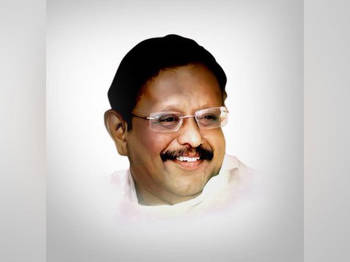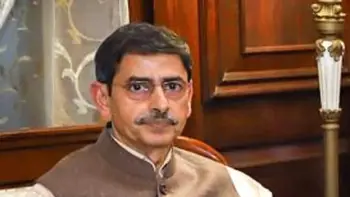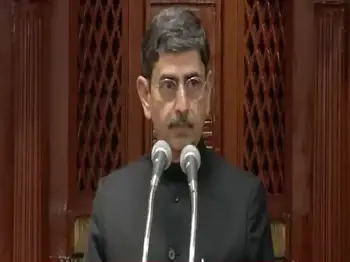Tamil Nadu Anti-Gambling Law: Govt bans online gambling; Here's all you need to know

Tamil Nadu, India: On April 10, the Tamil Nadu Government notified the Online Gambling and Regulation of Online Games Bill, after Governor RN Ravi gave his assent, following which it was published in the Government Gazette. The legislation is set to come into force in Tamil Nadu following the notification. The legislation prohibits advertisements to promote online gambling or online games of chance. The legislation has specified rummy and poker as online games of chance, prohibiting playing them with money or other stakes.
The legislation states that a person providing online gambling services or online games of chance will be liable for imprisonment up to three years or with a fine up to Rs 10,00,000 or both. The legislation also states that a person advertising and inducing another person to indulge in online gambling or online games of chance will be liable for imprisonment of up to one year or with a fine up to Rs 5,00,000 or both. Furthermore, the legislation states that a person indulging in online gambling or online games of chance shall be punished with imprisonment for up to three months or with a fine up to Rs 5000 or both.
The legislation also prohibits banks, financial institutions and payment gateways from engaging in a transaction or authorising funds towards payment for any online gambling or any online game of chance specified in the Schedule.
The State Government decided to prohibit online gambling and online games of chance after numerous instances of suicides, financial ruin or debt traps surfaced. The State Government passed the Ordinance to ban online gambling and online games of chance such as poker and rummy on October 3, 2022. The Governor promulgated the Ordinance on October 7, 2022.
The State Government passed a Bill to replace the Ordinance on October 19, 2022. The Bill was sent to the Governor for his assent. The Governor returned the Bill to the State Government on March 26. The Governor cited a ‘lack of legislative competence’ as one of the reasons for returning the Bill. However, the Governor has now given his assent to the Bill.
Establishment of Tamil Nadu Online Gaming Authority
The legislation will establish the Tamil Nadu Online Gaming Authority under the chairpersonship of an officer who has retired from a post, not below the rank of Chief Secretary to the Government.
Furthermore, it will have four other members including an officer, who has retired from a post, not below the rank of Inspector General of Police, an expert in the field of information technology, an eminent psychologist and an expert in the field of online gaming.
The Authority will be responsible for regulating online games and issuing certificates of registration to local online game providers. Furthermore, it will identify online games of chance and recommend them to the State Government for inclusion in the Schedule. It will also oversee the functioning of online game providers in the State and collect and maintain their information and data with regard to their activities.
The Authority will also act as a grievance resolution body for complaints received against online game providers. It will be vested with powers similar to a Civil Court under the Code of Civil Procedure, 1908.
Regulations for Local and Non-Local Online Games Providers
The legislation creates a distinction between regulations governing local and non-local online game providers. The legislation states that the local games provider shall not provide online gaming services without a certificate of registration from the Authority on and after the appointed day.
The legislation provides for a process to deal with a local online games provider’s compliance. The Authority can revoke the certificate of registration of a local online games provider if it believes that the certificate has been obtained through misrepresentation or fraud, or the certificate holder has failed to comply with the legislation, or the certificate holder has contravened the provisions of the legislation. The Authority must record the reasons in writing before revoking the certificate.
The legislation states that no non-local online games provider shall provide online gambling services, online games of chance specified in the Schedule or other games in contravention to the legislation in the state.
The legislation states that no non-local online games provider would be deemed to have contravened the legislation if it has exercised due diligence and provided geo-blocking in the state. The legislation states that it would be deemed that the non-local online games provider have exercised due diligence if it has informed prospective customers that the state has banned online gambling and online game of chance for people physically present in the state and has performed other obligations mentioned in the legislation to ensure that the customers are not physically present in the state.
The legislation allows the Authority to serve show-cause notices to non-local online games providers if it has failed to comply with the legislation’s provisions. Furthermore, the Authority can make a recommendation to the State Government to request the Government of India to block access to people in the state to a particular non-local online games provider, if the Authority believes that the provider’s reply to the show cause is not satisfactory.
PILs against online gambling across India
It is pertinent to note that various Public Interest Litigations (PILs) have been filed against the promotion and providing online gambling services across India.
A Bihar-based activist has filed a PIL against BCCI President Saurav Ganguly, cricketers Rohit Sharma and Hardik Pandya and actor Aamir Khan for encouraging gambling in a local court. The PIL alleges that these sportsmen and actors are ruining the youth’s future by involving them in online games related to IPL.
In 2022, a Tirunelveli-based activist filed a PIL before the Madras High Court seeking restrictions on the participation of minors in online gambling and sports betting websites and applications. The petitioner argued that the increase in the number of online gambling websites and applications has led to an increase in the number of minors participating in online gambling. Furthermore, the petitioner cited suicide cases of minors with an online gambling addiction while highlighting the need for firmer laws.













